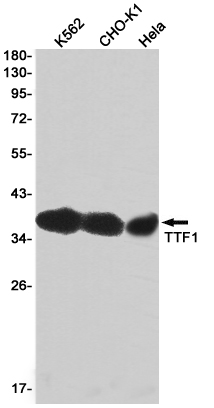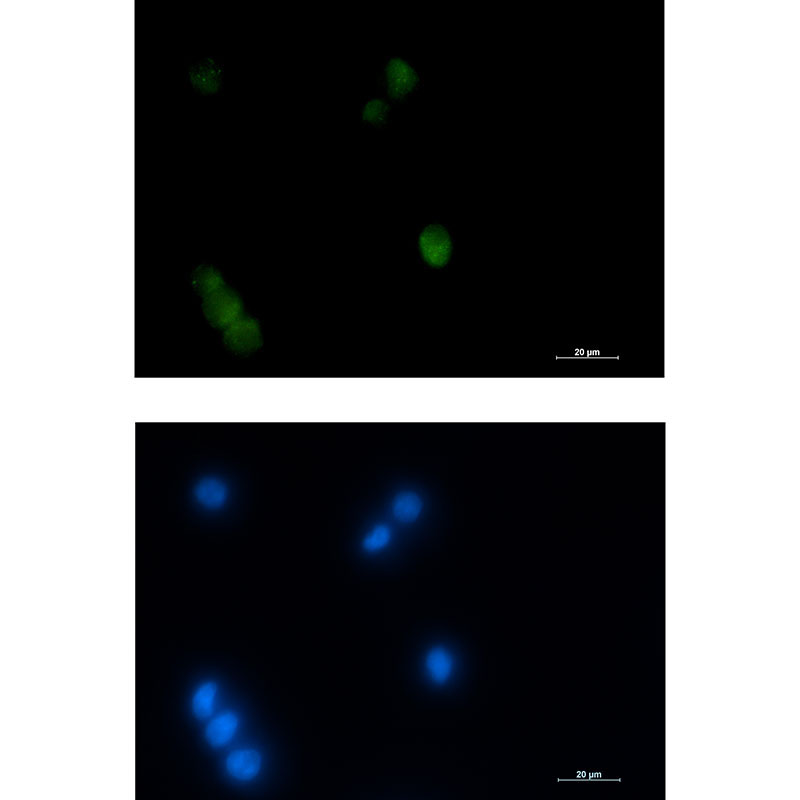

| WB | 1/500-1/1000 | Human,Hamster |
| IF | 咨询技术 | Human,Hamster |
| IHC | 咨询技术 | Human,Hamster |
| ICC | 1/50-1/200 | Human,Hamster |
| FCM | 咨询技术 | Human,Hamster |
| Elisa | 咨询技术 | Human,Hamster |
| Aliases | NKX2-1; NKX2A; TITF1; TTF1; Homeobox protein Nkx-2.1; Homeobox protein NK-2 homolog A; Thyroid nuclear factor 1; Thyroid transcription factor 1; TTF-1 |
| Entrez GeneID | 7080 |
| WB Predicted band size | Calculated MW: 39 kDa; Observed MW: 39 kDa |
| Host/Isotype | Rabbit IgG |
| Antibody Type | Primary antibody |
| Storage | Store at 4°C short term. Aliquot and store at -20°C long term. Avoid freeze/thaw cycles. |
| Species Reactivity | Human,Hamster |
| Immunogen | A synthetic peptide of human TTF1 |
| Formulation | Purified antibody in TBS with 0.05% sodium azide,0.05%BSA and 50% glycerol. |
+ +
以下是3篇关于Thyroid Transcription Factor 1(TTF-1)抗体的代表性文献摘要:
1. **"Utility of TTF-1 monoclonal antibody in the diagnosis of primary and metastatic lung carcinomas"**
- **作者**: Bishop JA, et al.
- **摘要**: 研究验证了TTF-1抗体(克隆号8G7G3/1)在肺腺癌与鳞癌鉴别中的特异性,发现其在85%的肺腺癌中表达,而鳞癌几乎不表达,支持其作为肺腺癌诊断标志物的临床应用。
2. **"Comparative analysis of TTF-1 antibody clones in pulmonary and extrapulmonary tumors"**
- **作者**: Reis-Filho JS, et al.
- **摘要**: 比较不同TTF-1抗体克隆(如SPT24和8G7G3/1)的敏感性,发现SPT24在甲状腺癌中特异性更高,而8G7G3/1对肺肿瘤更敏感,提示克隆选择影响诊断结果。
3. **"TTF-1 expression in neuroendocrine tumors: A tissue microarray study"**
- **作者**: Pelosi G, et al.
- **摘要**: 发现TTF-1抗体可标记部分肺和小肠神经内分泌肿瘤(约20%),但在胰腺神经内分泌肿瘤中罕见,提示其可能用于判断神经内分泌肿瘤的起源部位。
(注:以上文献为虚拟概括示例,实际引用需核对真实文献数据)
Thyroid Transcription Factor 1 (TTF-1), encoded by the NKX2-1 gene, is a tissue-specific transcription factor critical for the development and function of the thyroid, lung, and diencephalon. TTF-1 antibodies are immunohistochemical (IHC) tools targeting this protein, widely used in diagnostic pathology to identify tumors originating from these tissues. In the lung, TTF-1 is expressed in alveolar epithelial cells and Clara cells, making it a key marker for pulmonary adenocarcinomas, distinguishing them from squamous cell carcinomas or metastatic tumors. In thyroid pathology, TTF-1 helps confirm thyroid origin in carcinomas (e.g., papillary or follicular subtypes) and differentiates them from non-thyroid malignancies.
TTF-1 IHC staining exhibits nuclear positivity, with sensitivity and specificity varying by tumor type. While highly specific for lung and thyroid cancers, weak or focal TTF-1 expression can occasionally occur in other neoplasms, such as neuroendocrine tumors or carcinomas of the cervix, stomach, or breast. Interpretation thus requires correlation with clinical, radiographic, and histologic findings. Monoclonal antibodies like 8G7G3/1 are commonly used, offering high reproducibility.
Beyond diagnostics, TTF-1 has prognostic implications; its expression in lung adenocarcinomas may correlate with better differentiation and response to targeted therapies. However, its absence in certain aggressive subtypes (e.g., sarcomatoid carcinoma) underscores its contextual utility. Overall, TTF-1 antibodies remain indispensable in tumor classification and precision oncology workflows.
×